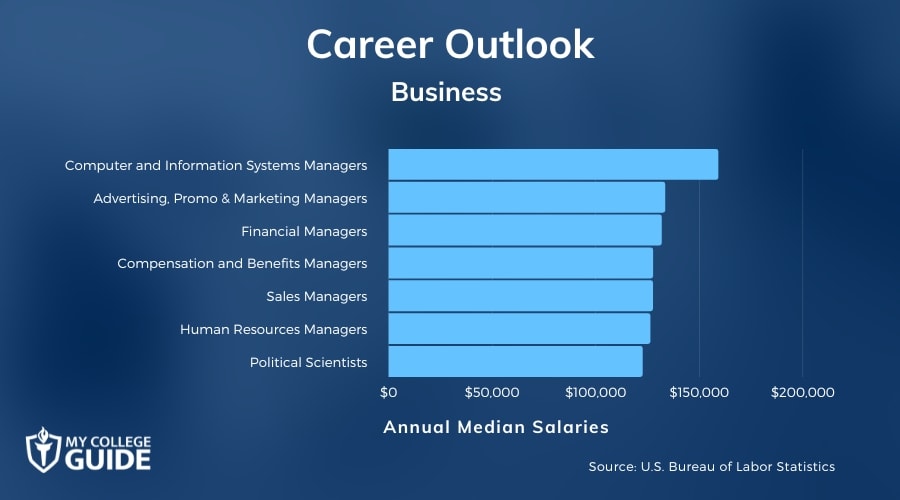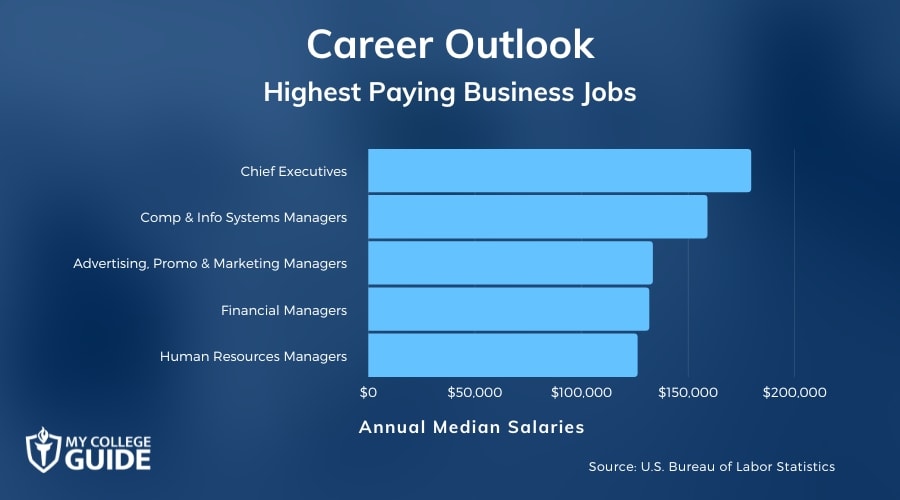Why are so many types of business degrees in high demand? Two words: versatility and flexibility.

At the foundation of every company and organization are standard business principles. The skills and training a business degree program can help you develop may be applied almost anywhere and in almost any industry.
Editorial Listing ShortCode:
The subject matter lends itself to online learning, which can give you the opportunity to tailor your education around existing work and family commitments and progress at your own pace.
25 Types of Business Degrees

When considering what a business administration degree is good for, will you cast a wide net by selecting a concentration that is applicable in nearly any business setting (like accounting)? Or will you opt to sharpen skills specific to one industry?
With over two dozen different types of business majors to choose from, the hardest part may be narrowing down your choices.
Select the program that most interests you to jump to that section of the guide:
- Accounting
- Advertising
- Business Information Systems
- Business Management
- E-Commerce
- Economics
- Entrepreneurship
- Finance
- General Business Administration
- Healthcare Management
- Hospitality Management
- Human Resources
- Information Systems Management
- International Business
- Internet Marketing (E-Marketing)
- Marketing
- Operations Management
- Organizational Leadership
- Project Management
- Public Administration
- Public Relations
- Sales
- Small Business
- Statistics
- Supply Chain Management
You may want to explore your options to decide which program is right for you.
Accounting

Do you love to crunch numbers, gather data, and make predictions? With budgeting and tax preparation software becoming more affordable and user-friendly, major changes are occurring in the field of accounting.
While classes vary from school to school, some common courses in accounting degree programs include accounting, business computing concepts, taxation, principles of finance, and statistics. After graduating from an accounting degree program, you can choose to work in various businesses as a budget analyst, financial analyst, accountant, or auditor.
Editorial Listing ShortCode:
If you enjoy analyzing, comparing, and interpreting data and number figures, you may do well in an accounting program.
Advertising

Have you put more thought into website banners, catchy TV commercials, or engaging campaigns than the average consumer? Maybe you’re ready to expand on that with a concentration on advertising.
Some common courses in advertising degree programs include account planning, market research, creative strategy, and retail advertising. Some popular jobs among advertising graduates include marketing managers, advertising sales agents, and marketing assistants.
Editorial Listing ShortCode:
Advertising is a creative sector of business. If you enjoy creativity and leadership roles, advertising could be a good choice for you.
Business Information Systems

If the hows and whys of technology aren’t your thing but determining which programs can most effectively solve problems is exciting, you may want to consider a concentration in business information systems.
As a business information systems degree major, you may take classes like principles of management, information systems design and management, database concepts, and database management. Business information systems careers include tech-related positions like computer network architects, computer and information systems managers, and information security analysts.
Editorial Listing ShortCode:
You may do well in business information systems if you can effectively communicate your ideas to people with all levels of tech know-how (others in IT, senior staff, customers, etc.). Business information systems combine business and technology.
Business Management

Business management may be a great choice if you’re interested in leading a business or even owning your own one day. This concentration can help you develop an understanding of the economic, legal, behavioral, ethical, and strategic aspects of business and how they interact.
While classes vary from school to school, some common courses in business management degree programs include accounting, business law, business ethics, and managerial decision-making. Business management students can go on to apply for jobs like compensation and benefits managers, sales managers, and management analysts.
Editorial Listing ShortCode:
You may do well in business management if you can make decisions confidently and quickly and possess the ability to remain calm and optimistic when the pressure is on.
E-Commerce

Are you torn between business and technology? You can pursue a combination of the two! An e-commerce program can give you opportunities to learn about creating and maintaining businesses on the internet.
Some common courses in e-commerce degree programs include web design, internet marketing, advertising, economics, and computer programming. After completing an e-commerce program, you can apply to jobs like sales manager, web developer and digital designer, internet marketing specialist, marketing analyst, and more.
Editorial Listing ShortCode:
Those who work in e-commerce tend to enjoy learning about new technologies, have a creative mindset, and can think on their feet and adapt to a dynamic field.
Economics

A degree in economics can help give you opportunities to apply your skills in a variety of industries, including education, health, environmental careers, research firms, large corporations, and government.
While classes vary from school to school, some common courses in economics degree programs include financial accounting, managerial accounting, statistics, business cycles, and forecasting. Economics majors can go on to apply to positions like economists, statisticians, financial analysts, and budget analysts.
Editorial Listing ShortCode:
If you are math-savvy and breeze through statistics and calculus classes and can think analytically, using data to draw conclusions and make projections you may do well in an economics program.
Entrepreneurship

If you’re considering majoring in entrepreneurship, you’ve probably got plenty of ideas and drive. Majoring in entrepreneurship can help you to turn your dreams into reality.
The skills that can be developed in this field of study can be valuable in almost any business position. Some of the courses and skills you’ll study include business plan development, accounting, business strategy, and fundamentals of leadership.
Editorial Listing ShortCode:
Students who complete an entrepreneurship degree program can apply for jobs as management analysts, accountants, and even chief executives. You may do well in entrepreneurship if you are constantly brainstorming new ideas, concepts, and solutions.
If owning your own business and being the driving force behind it sounds like the right path for you, you could consider entrepreneurship.
Finance

Pursuing a degree in finance can help you learn how to make money by knowing money. This field of study focuses on how individuals, institutions, governments, and businesses acquire, allocate, and manage funds and other financial assets.
While classes vary from school to school, some common courses in finance degree programs include corporate finance, accounting, personal finance, money and banking, and business law. Some jobs that can be pursued with a finance degree include financial managers, personal financial advisors, financial analysts, and loan officers.
Editorial Listing ShortCode:
If you are a natural problem solver and are able to analyze data, find patterns, and make predictions, finance may be a good fit for you.
General Business Administration

If you know you’re business-minded but haven’t yet selected a specific focus, general business administration may be an excellent choice.
After completing your degree, if you’ve found your niche and want to dig deeper, it can also help you pursue a more specialized graduate degree. Some common courses you may take in a general business administration degree program include financial accounting, business ethics, principles of management, and business law.
Editorial Listing ShortCode:
Some jobs that can be pursued with a general business administration degree include sales managers, financial analysts, human resource specialists, and more. You may do well in general business administration if you desire a broad education that allows flexibility in career choice and adapts well to different roles.
Healthcare Management

You don’t have to be a doctor to succeed and make money in the healthcare industry. A concentration in healthcare management can help prepare you for leadership positions at hospitals, nursing homes, insurance companies, nonprofit organizations, and government agencies.
While classes vary from school to school, these are some common courses in healthcare management degree programs include healthcare administration, healthcare planning, and managing a diverse workforce. Some jobs that can be pursued with a healthcare management degree include medical and health service manager, social and community service manager, and medical records specialist.
Editorial Listing ShortCode:
If you possess the interpersonal skills necessary to manage and mentor others you may do well in this field. Healthcare management careers allow you to combine your passion for business and helping others in the healthcare field.
Hospitality Management

Are you the type of person who is always taking care of others? If so, the hospitality industry might be a good fit for you.
A hospitality management degree program may include courses like dining room management, travel and tourism, and hospitality law. Graduates of a hospitality management degree program may qualify for jobs like food service managers, lodging managers, and event planners.
Editorial Listing ShortCode:
You may do well in hospitality management if you are a true people person and can multitask and communicate effectively with everyone and are friendly and social.
Human Resources

If you’re truly a people person, then human resources may be the career field for you! The skills that can be learned in this field of study can be invaluable in recruiting, selecting, training, and retaining employees.
This program can also teach you how to oversee employee benefit programs, manage support staff, handle legal and ethical infractions, facilitate payroll, and more. Common courses include human resources management, staffing, and employee and labor relations.
Editorial Listing ShortCode:
Some jobs that can be pursued with a human resources degree include human resource managers, human resource specialists, and training and development specialists. You may do well in human resources if you empathize and get along well with others. If you are a people person and love working with others, human resources may be a great option for you.
Information Systems Management

Pursuing an information systems management degree can help you learn how to evaluate a company’s technical needs and make and implement plans to keep things running optimally.
It can help you gain an understanding of databases, networks, information security, computer hardware, and software including various courses like fundamentals of software development, systems analysis and design, information security, and business computer networking.
Editorial Listing ShortCode:
Some jobs that can be pursued with an information systems management degree include computer network architects, computer system analysts, and database administrators. You may do well in information systems management if you enjoy working with technology and keeping abreast of changes in the field.
If you enjoy the tech side of the business and analyzing data, information systems management careers may be a good choice for you.
International Business

This field can help you become familiar with exchange rates, foreign trade, foreign markets, and conducting all aspects of business internationally.
While classes vary from school to school, some common courses in international business degree programs include international business strategy, international finance, cross-cultural management, and global marketing. Some jobs that can be pursued with an international business degree include marketing managers, financial managers, and management positions.
Editorial Listing ShortCode:
You may do well in international business careers if you are culturally sensitive and have extraordinary communication and language skills. An international business program could be a great option to travel the world and use your business skills.
Internet Marketing (E-Marketing)

You can go beyond spam, scams, and pop-ups and learn how to legitimately reach the public online by studying internet marketing.
Earning this degree can help you learn how to target specific audiences, create valuable and dynamic content, and use search engine optimization to increase exposure. While classes vary from school to school, some common courses in internet marketing degree programs include marketing principles, consumer behavior, marketing research, and digital marketing.
Editorial Listing ShortCode:
Some jobs that can be pursued with an internet marketing degree include marketing analysts, advertising sales agents, and advertising, promotions, and marketing managers. You may do well in internet marketing if you are tech and internet-savvy, follow internet trends, and are creative.
Internet marketing features a wide range of careers but allows you to harness the power of the Internet to reach millions.
Marketing

If friends would describe you as persuasive and captivating, marketing might be a good fit for you. A focus in marketing typically covers online marketing and more traditional avenues, such as print media, broadcast media, and direct mail.
A focus in marketing typically covers online marketing and more traditional avenues, such as print media, broadcast media, and direct mail. You’ll likely have common courses like business ethics, multimedia marketing, principles of marketing, and consumer behavior. Some jobs that can be pursued with a marketing degree along include marketing managers, marketing analysts, market researchers, and advertising sales agents.
Editorial Listing ShortCode:
You may do well in marketing if you enjoy research and are creative and enjoy developing new concepts. Marketing combines research, creativity, and business into one career field.
Operations Management

Do you prefer to work behind the scenes? An operations management program can help you learn how to observe and control the supply chain and production.
This field of study typically focuses on solving product problems, streamlining transportation and delivery, regulating inventory, and attempting to simplify processes and reduce costs. While classes vary from school to school, some common courses in operations management degree programs include sustainable operations, project management, and operations management.
Editorial Listing ShortCode:
Some jobs that can be pursued with an operations management degree include sales managers, industrial production managers, and operations research analysts. You may do well in operations management if you are observant and analytical and can easily identify problems and look for solutions.
Organizational Leadership

An organizational leadership program can help you strengthen your communication and conflict-resolution skills and help you learn how to support and drive organizations through periods of transformation.
While classes vary from school to school, some common courses in organizational leadership degree programs include leading organizational change, team building, and strategic thinking. After graduating, some jobs that can be pursued with an organizational leadership degree include human resource managers, training and development managers, and human resource specialists.
Editorial Listing ShortCode:
You may do well in organizational leadership if you communicate well with others and can compel and excite a group. Organizational leadership careers can be ideal for someone who likes to teach others and help a business succeed.
Project Management

By pursuing a degree in project management, you can learn how to help your company operate faster and more efficiently.
While classes vary from school to school, some common courses in project management degree programs include organizational management, leadership, cost management, and project management. After completing a project management degree program, some jobs that can be pursued include project management specialists, management analysts, cost analysts, and more.
Editorial Listing ShortCode:
If you enjoy being in a leadership role and are a good communicator, project management may be a good choice.
Public Administration

If you’d like to work in government or with an advocacy group or non-profit organization, public administration may be the field of study for you.
Some common courses in public administration degree programs you may take include American politics, social issues, economic policies, and public administration ethics and theory. After completing the degree program, some jobs that can be pursued with a public administration degree include political scientist, urban and regional planner, and social and community service manager.
Editorial Listing ShortCode:
You may do well in public administration if you are involved in your community and have excellent people skills. Public administration careers allow you to help others, help your community and use your business skills.
Public Relations

Earning a degree in public relations can give you a chance to learn how to communicate strategically, plan events, and improve and preserve the relationships businesses have with clients, customers, shareholders, the public, and the media.
Some common courses in public relations degree programs are marketing, advertising, communications, media planning, and creative strategy. Once you finish a public relations degree, you can apply to jobs like public relations managers, fundraising managers, and public relations specialists.
Editorial Listing ShortCode:
You may do well in public relations if you love to write and communicate, follow current events and trends and have a positive outlook.
Sales

Could you sell a ketchup popsicle to a woman in white gloves? You may want to secure a spot in a sales program where you can explore the theories, concepts, and practices relevant to sales.
When earning a sales business degree, some common courses include business-to-business marketing, sales management, professional sales, and business communications. Some jobs that can be pursued with a sales degree include wholesale and manufacturing sales representatives, insurance sales agents, and real estate brokers and sales agents.
Editorial Listing ShortCode:
You may do well in sales if you are outgoing and confident and also good at persuading others. Sales careers are a good choice if you have the personality for selling and are self-motivated to meet your goals.
Small Business

Small business programs often focus on how to run and effectively manage a small business. While classes vary from school to school, some common small business courses include small business ventures, marketing for small businesses, and sales management.
Editorial Listing ShortCode:
Jobs that can be pursued with a small business degree include but are not limited to project management specialists, marketing research analysts, and human resource specialists. You may do well in a small business career if you have the desire to own or start your own business and are self-motivated and good at working independently.
Statistics

If problem-solving and probability interest you, you may enjoy studying statistics. In this course of study, you can learn how to gather, analyze, and interpret data to help businesses make decisions or plan for trends.
Editorial Listing ShortCode:
When majoring in business with statistics, classes will likely vary from school to school, but some common courses you may encounter include probability theory, calculus, algebra, and statistical methods. Some jobs that can be pursued with a statistics degree include actuary, statistician, and survey researcher. You may do well in statistics if you love math, think analytically, and can organize and simplify data.
Supply Chain Management

Studying supply chain management can help you hone those skills. This field of study typically focuses on how to procure and allocate supplies, manage inventory, coordinate distribution and transportation, and propose logistical improvements.
Those pursuing a supply chain management degree program may take courses like strategic supply chain management, distribution fulfillment, purchasing and procurement, and strategic sourcing. Some jobs that can be pursued with a supply chain management degree include logistician, business operation specialists, cost estimators, and more.
Editorial Listing ShortCode:
You may do well in supply chain management if you are highly organized, like to plan ahead, and can multitask. If you enjoy networking and planning specific projects, a supply chain management business major may be a good choice.
Different Types of Business Degree Levels

What degree levels are offered in business administration? There are 4 levels of different types of business degrees to choose from, all of which you can earn online or in the classroom.
- Associate’s Degree: In just 2 years, an associate degree can help you develop an understanding of fundamental business principles and some technical know-how in your chosen industry.
- Bachelor’s Degree: A 4-year degree program will typically provide a richer understanding of business principles, digging deeper into communication, leadership, ethics, and strategic planning. A bachelor’s degree in business can help you develop the tools needed to take on administrative and managerial roles.
- Master of Business Administration (MBA): Continuing your education for another 2 years beyond a bachelor’s can help you hone specific skills even further. An accredited MBA from a respected business school can help equip you for leadership positions.
- Doctorate of Business Administration (DBA): With an additional 3 to 6 years of study beyond a bachelor’s and master’s degree, you can focus even further on the application of business theories. This degree can help increase your earning potential and broaden your access to leadership roles.
To decide what’s best for you when asking what types of business degrees are there, you will need to consider your career goals and the amount of time you want to commit to the different business degrees.
Business Careers & Salaries

Because degrees for business are so versatile, there are thousands of jobs you can choose to pursue, or you may even create one for yourself. You may be wondering what business degrees make the most money.
Editorial Listing ShortCode:
Here is a glimpse of various business degree job titles and salaries your degree might land you. All salary data is provided by the U.S. Bureau of Labor Statistics.
| Careers | Annual Median Salaries |
| Computer and Information Systems Managers | $159,010 |
| Advertising, Promotions, and Marketing Managers | $133,380 |
| Financial Managers | $131,710 |
| Compensation and Benefits Managers | $127,530 |
| Sales Managers | $127,490 |
| Human Resources Managers | $126,230 |
| Political Scientists | $122,510 |
| Computer Network Architects | $120,520 |
| Training and Development Managers | $120,130 |
| Public Relations and Fundraising Managers | $119,860 |
| Actuaries | $105,900 |
| Economists | $105,630 |
| Industrial Production Managers | $103,150 |
| Information Security Analysts | $102,600 |
| Medical and Health Services Managers | $101,340 |
| Computer System Analysts | $99,270 |
| Top Executives | $98,980 |
| Database Administrators and Architects | $98,860 |
| Mathematicians and Statisticians | $96,280 |
| Personal Financial Advisors | $94,170 |
| Management Analysts | $93,000 |
| Operations Research Analysts | $82,360 |
| Financial Analysts | $81,410 |
| Budget Analysts | $79,940 |
| Urban and Regional Planners | $78,500 |
| Accountants and Auditors | $77,250 |
| Web Developers and Digital Designers | $77,200 |
| Logisticians | $77,030 |
| Social and Community Service Managers | $74,000 |
| Loan Officers | $63,380 |
| Wholesale and Manufacturing Sales Representatives | $62,890 |
| Public Relations Specialists | $62,800 |
| Human Resources Specialists | $62,290 |
| Survey Researchers | $59,740 |
| Food Service Managers | $59,440 |
| Lodging Managers | $59,430 |
| Tax Examiners and Collectors, and Revenue Agents | $56,780 |
| Advertising Sales Agents | $52,340 |
| Insurance Sales Agents | $49,840 |
| Meeting, Convention, and Event Planners | $49,470 |
| Real Estate Brokers and Sales Agents | $48,770 |
Although you’ll notice business degrees in demand, depending on the employer, you may need additional education or work experience to qualify for some of these jobs.
Accreditation for Different Business Degrees

When selecting a school, it’s important to review the university’s accreditation. At a minimum, a reputable university will be regionally accredited.
In addition to regional accreditation, some universities have an additional level of accreditation specific to the business program:
- Association to Advance Collegiate Schools of Business (AACSB)
- Accreditation Council for Collegiate Business Schools and Programs (ACBSP)
Accreditation can help ensure that you’ll receive a quality education that meets industry standards. To check if your desired school is accredited, you can visit the US Department of Education’s website.
What is a Business Degree?

A business degree is a degree course program that teaches the various aspects of a business. Although there are various types of degrees in business, you can expect to learn about finance, marketing, management, and administration.
Throughout the courses, you’ll also learn how to take the information and apply it to real-world business problems. You will likely also dive into business ethics and other courses to properly manage the business world.
Editorial Listing ShortCode:
A business degree will prepare students to enter the world of business with confidence and the proper knowledge to help in various departments of a business like marketing, accounting, information systems, and management.
What Can You Do With a Business Degree?

The many business degree types can prepare you for various careers. If you enjoy management and working with people, you may want to look for a career in human resource management.
According to the BLS, human resource managers can make a median annual salary of $126,230. Perhaps you are more interested in the creative side of the business. In that case, you may want to dive into marketing. Marketing specialists can earn up to $63,920 per year. You can also work on the technology side of a business in database management.
If you have your eyes set on the top positions, consider working your way up to a chief executive, which can earn up to $179,520.
What Are the Highest Paying Business Jobs?

A business degree opens the doors to a lot of career options. According to the BLS, some of the highest-paying careers for a business degree holder include the following:
- Chief Executive: $179,520
- Computer and Information Systems Managers: $159,010
- Advertising, Promotions, and Marketing Managers: $133,380
- Financial Managers: $131,710
- Human Resources Managers: $126,230
While this list is not exhaustive, it gives you a peek into earning potential. Depending on the employer, you may need additional education or work experience to qualify for some of these jobs.
How Long Does it Take to Get a Business Degree Online?

The amount of time a business degree online takes to complete depends on the level of degree you are looking to earn.
| Degree Level | Average Time to Complete |
| Associate Degree | 2 years |
| Bachelor’s Degree | 4 years |
| Master of Business Administration (MBA) | Bachelor’s Degree + 2 years |
| Doctorate of Business Administration (DBA) | Bachelor’s and Master’s Degree + 3 to 6 years |
If you follow a traditional, 16-week semester and attend full-time, it will take four years for a bachelor’s degree. If you follow an 8-week semester and stay continuously enrolled year-round, you can finish in less time.
Is a Business Degree Worth it?

Yes, a business degree is worth it for many professionals. According to the BLS, business and financial occupations are projected to grow 7% over the next 10 years, adding around 715,100 new jobs.
Marketing professionals within the advertising, promotions and marketing sectors are projected to see 10% job growth over the next decade. If you’re interested in the technology side of the business, information technology occupations are projected to grow 15% over the same time period. As you can see, there is a lot of demand for business professionals.
Getting Your Degree in Business Online

There is such a variety of business degrees that you can customize your education to fit your future career goals. Will you cast a wide net by selecting a concentration that is applicable in nearly any business setting, or will you instead opt to sharpen skills specific to one industry?
Do you plan to study for two years so you can jump right into the workforce, or continue your education indefinitely? Are business degrees online the most practical for your lifestyle, or would you prefer to sit in a classroom with your peers?
Not all of these decisions must be made upfront, but they are all things to consider as you begin the journey toward a business degree and as you research accredited colleges.
